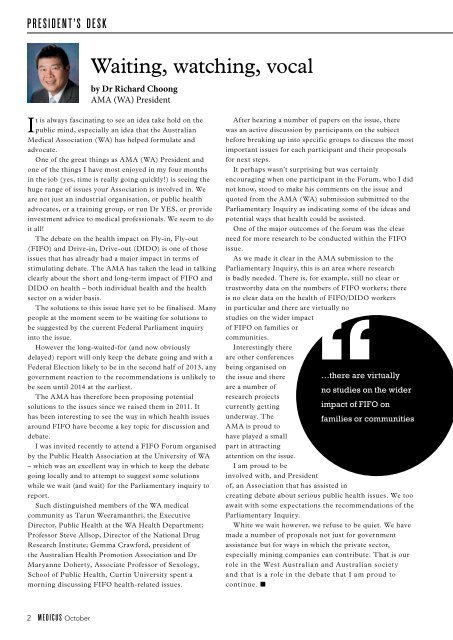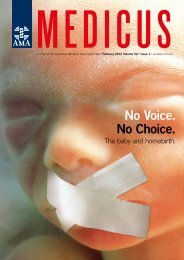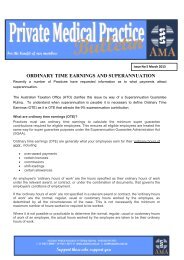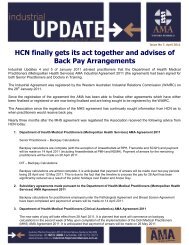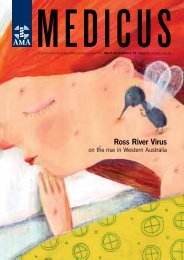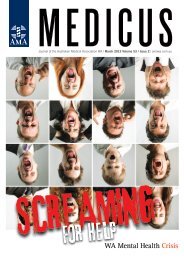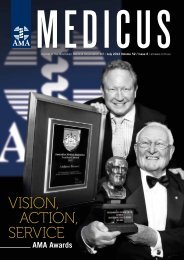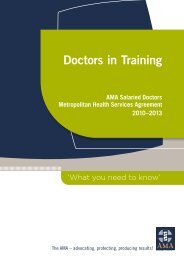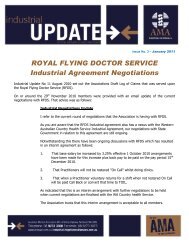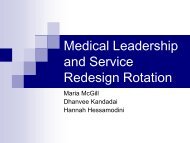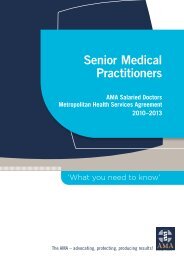twrama 1990_final oc.. - AMA WA
twrama 1990_final oc.. - AMA WA
twrama 1990_final oc.. - AMA WA
Create successful ePaper yourself
Turn your PDF publications into a flip-book with our unique Google optimized e-Paper software.
PRESIDENT’S DESK<br />
Waiting, watching, v<strong>oc</strong>al<br />
by Dr Richard Choong<br />
<strong>AMA</strong> (<strong>WA</strong>) President<br />
It is always fascinating to see an idea take hold on the<br />
public mind, especially an idea that the Australian<br />
Medical Ass<strong>oc</strong>iation (<strong>WA</strong>) has helped formulate and<br />
adv<strong>oc</strong>ate.<br />
One of the great things as <strong>AMA</strong> (<strong>WA</strong>) President and<br />
one of the things I have most enjoyed in my four months<br />
in the job (yes, time is really going quickly!) is seeing the<br />
huge range of issues your Ass<strong>oc</strong>iation is involved in. We<br />
are not just an industrial organisation, or public health<br />
adv<strong>oc</strong>ates, or a training group, or run Dr YES, or provide<br />
investment advice to medical professionals. We seem to do<br />
it all!<br />
The debate on the health impact on Fly-in, Fly-out<br />
(FIFO) and Drive-in, Drive-out (DIDO) is one of those<br />
issues that has already had a major impact in terms of<br />
stimulating debate. The <strong>AMA</strong> has taken the lead in talking<br />
clearly about the short and long-term impact of FIFO and<br />
DIDO on health – both individual health and the health<br />
sector on a wider basis.<br />
The solutions to this issue have yet to be <strong>final</strong>ised. Many<br />
people at the moment seem to be waiting for solutions to<br />
be suggested by the current Federal Parliament inquiry<br />
into the issue.<br />
However the long-waited-for (and now obviously<br />
delayed) report will only keep the debate going and with a<br />
Federal Election likely to be in the second half of 2013, any<br />
government reaction to the recommendations is unlikely to<br />
be seen until 2014 at the earliest.<br />
The <strong>AMA</strong> has therefore been proposing potential<br />
solutions to the issues since we raised them in 2011. It<br />
has been interesting to see the way in which health issues<br />
around FIFO have become a key topic for discussion and<br />
debate.<br />
I was invited recently to attend a FIFO Forum organised<br />
by the Public Health Ass<strong>oc</strong>iation at the University of <strong>WA</strong><br />
– which was an excellent way in which to keep the debate<br />
going l<strong>oc</strong>ally and to attempt to suggest some solutions<br />
while we wait (and wait) for the Parliamentary inquiry to<br />
report.<br />
Such distinguished members of the <strong>WA</strong> medical<br />
community as Tarun Weeramanthri, the Executive<br />
Director, Public Health at the <strong>WA</strong> Health Department;<br />
Professor Steve Allsop, Director of the National Drug<br />
Research Institute; Gemma Crawford, president of<br />
the Australian Health Promotion Ass<strong>oc</strong>iation and Dr<br />
Maryanne Doherty, Ass<strong>oc</strong>iate Professor of Sexology,<br />
School of Public Health, Curtin University spent a<br />
morning discussing FIFO health-related issues.<br />
After hearing a number of papers on the issue, there<br />
was an active discussion by participants on the subject<br />
before breaking up into specific groups to discuss the most<br />
important issues for each participant and their proposals<br />
for next steps.<br />
It perhaps wasn’t surprising but was certainly<br />
encouraging when one participant in the Forum, who I did<br />
not know, stood to make his comments on the issue and<br />
quoted from the <strong>AMA</strong> (<strong>WA</strong>) submission submitted to the<br />
Parliamentary Inquiry as indicating some of the ideas and<br />
potential ways that health could be assisted.<br />
One of the major outcomes of the forum was the clear<br />
need for more research to be conducted within the FIFO<br />
issue.<br />
As we made it clear in the <strong>AMA</strong> submission to the<br />
Parliamentary Inquiry, this is an area where research<br />
is badly needed. There is, for example, still no clear or<br />
trustworthy data on the numbers of FIFO workers; there<br />
is no clear data on the health of FIFO/DIDO workers<br />
in particular and there are virtually no<br />
studies on the wider impact<br />
of FIFO on families or<br />
communities.<br />
Interestingly there<br />
are other conferences<br />
being organised on<br />
the issue and there …there are virtually<br />
are a number of<br />
no studies on the wider<br />
research projects<br />
currently getting impact of FIFO on<br />
underway. The<br />
families or communities<br />
<strong>AMA</strong> is proud to<br />
have played a small<br />
part in attracting<br />
attention on the issue.<br />
I am proud to be<br />
involved with, and President<br />
of, an Ass<strong>oc</strong>iation that has assisted in<br />
creating debate about serious public health issues. We too<br />
await with some expectations the recommendations of the<br />
Parliamentary Inquiry.<br />
White we wait however, we refuse to be quiet. We have<br />
made a number of proposals not just for government<br />
assistance but for ways in which the private sector,<br />
especially mining companies can contribute. That is our<br />
role in the West Australian and Australian s<strong>oc</strong>iety<br />
and that is a role in the debate that I am proud to<br />
continue. ■<br />
2 MEDICUS October


